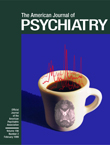Human Brain Metabolic Response to Caffeine and the Effects of Tolerance
Abstract
OBJECTIVE: Since there is limited information concerning caffeine’s metabolic effects on the human brain, the authors applied a rapid proton echo-planar spectroscopic imaging technique to dynamically measure regional brain metabolic responses to caffeine ingestion. They specifically measured changes in brain lactate due to the combined effects of caffeine’s stimulation of glycolysis and reduction of cerebral blood flow. METHOD: Nine heavy caffeine users and nine caffeine-intolerant individuals, who had previously discontinued or substantially curtailed use of caffeinated products because of associated anxiety and discomforting physiological arousal, were studied at baseline and then during 1 hour following ingestion of caffeine citrate (10 mg/kg). To assess state-trait contributions and the effects of caffeine tolerance, five of the caffeine users were restudied after a 1- to 2-month caffeine holiday. RESULTS: The caffeine-intolerant individuals, but not the regular caffeine users, experienced substantial psychological and physiological distress in response to caffeine ingestion. Significant increases in global and regionally specific brain lactate were observed only among the caffeine-intolerant subjects. Reexposure of the regular caffeine users to caffeine after a caffeine holiday resulted in little or no adverse clinical reaction but significant rises in brain lactate which were of a magnitude similar to that observed for the caffeine-intolerant group. CONCLUSIONS: These results provide direct evidence for the loss of caffeine tolerance in the human brain subsequent to caffeine discontinuation and suggest mechanisms for the phenomenon of caffeine intolerance other than its metabolic effects on elevating brain lactate.



